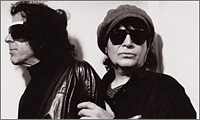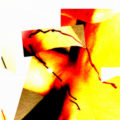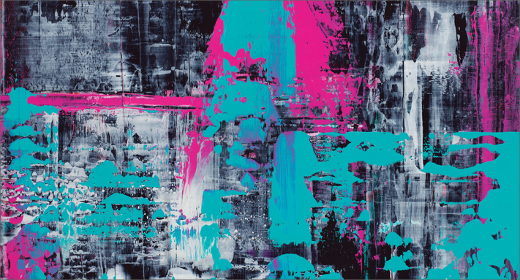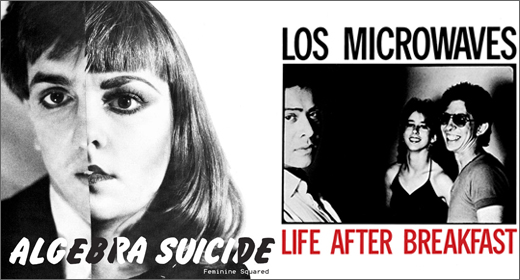
(07.27.08) Imagine a two-man band that used a droning Farfisa organ with primitive drum machines with plodding rhythms that were accompanied by rockabilly howling from the bowels of hell. You might raise and eyebrow out of curiosity but ultimately decide to pass on listening to tunes by such a band. Now imagine this band during the 1970’s in the context of groups of Yes and Genesis and how people might have reacted to this outlandish and abrasive sound. The band, of course, is Suicide.
While punk and post-punk were following the standard singer/guitar/bass/drums format, Martin Rev and Alan Vega were pushing the envelope of what a band could be with their minimalist act, all the while seething with anger and spewing vitriol at their audience.
Thirty years later their audience has finally caught up with Suicide and have been covered by everyone from Head of David to Bruce Springsteen. I recently had the opportunity to talk with Martin Rev and Alan Vega about their career in Suicide.
Igloo :: Today Suicide is widely recognized as a band that influenced synthpop, techno, industrial and electroclash but back in the 70’s many people came from a punk and a post-punk background and the regarded instruments like synthesizers as belonging to groups like Yes who they felt were very pompous and decadent. How did Suicide come together and given that so many people held instruments like synths in disdain, why did you become an electronic based-band in the first place?
Martin Rev :: Well, we didn’t decide to become an electronic-based band. Actually, we held that, and I know I felt the same way, that those bands that had layers of synths and very basic electronic devices to kinda get electronic sounds. I felt the same way about the bands I used to see on TV. You know, they were great for their world. But we weren’t coming from that directions and I never really used a synth at all until later on in the studio years later.
And also, were weren’t coming from a punk background, really. We just were what we were. later on we were called punk. We called ourselves punk a few years before that scene was called that. It wasn’t a conscious thing.
Alan Vega :: We did a show in 71. The show we did was actually in an art gallery. We put out flyers. Marty actually still has some of these flyers and we called it a “Punk Music Mass” and that was before anybody except Lest Bangs, who was the only guy to use the word “punk” when we wrote in article in ’69 about The Stooges. Up until then the word didn’t exist. But it was just an attitude thing. We never dreamed there would be a punk movement. I guess it started with The Ramones and then the Pistols and then suddenly the word “punk” is all over the place.
I was at a bar show once, I forget the name of the show at the time, but the word “punk” was actually used on a mainstream TV show and I was like “What the fuck, man. How did this happen?” But we never considered ourselves to be punk. We’ve been called everything under the sun. They always ask me what category should Suicide belong in and I always go “Well, it’s the Suicide category.” Maybe it’s country and eastern music, you know? But they never pigeonhole us. It’s still going on. Every generation that comes along, everybody’s like into Suicide and Suicide’s an influence on blah blah blah, so now we belong to this category, and we belong in that category and I just say it’s Suicide, ’cause we don’t sound like anybody else. A lot of people do our stuff. I mean hundreds of bands have been doing our stuff through the years. They still don’t like Suicide. They do our songs but they don’t sound like us.
Igloo :: What sort of background were you two coming from before you began Suicide?
Martin Rev :: I was, of course, a musician from an early age and musician like in intent and I knew that’s what I wanted to do and a little bit of a visual arts background and Alan was very much a visual artist. So we were coming together as individual artists who had been doing what we did. Even though we were quite young we were doing it very intensely and intently for many years up till that time as individual artists and kind of living the life that that kind of created. At that point we just came together and realized that we could work together because we shared a space that allowed us to work with some other people and that’s how it started.
Igloo :: During this time the usual format for a band was a guitar, maybe two guitars, and bass and drums so what led to the decision to become a two-person band?
Martin Rev :: I think it was necessity. We started out as a three people but our guitarist, who was like a free-sound guitarist and also a visual artists, soon after went into film and decided that Suicide was not going to be his future. We knew we weren’t going to keep a band together for that long based on what we did, the amount of space we might have for rehearsal, which was always limited, and the amount of money we had for equipment and the amount we gigs we. We were starting from scratch. And also where we we coming to as individuals. I was hearing another sound. I was hearing the possibility of bringing a drum machine which would allow one to almost make all the music because I could arrange it almost like, orchestrate, you might say, to use a cliched word. To really take in and take out parts as opposed to saying to bass player don’t play here or drummer don’t play here, which doesn’t get done in a regular band too much. It was all electronics and that was a whole new world of possibilities. And again, necessity being… you know, whenever we went to a gig we had haul our own stuff some how and that war really what became later on with hip hop and rap: two guys, DJs and MCs, which was also out of necessity. What could be afforded and what could be done with what you had. That’s how a lot of scratching came about and a lot of sampling.
Igloo :: These days electronic musicians use laptops and keyboards and quite a few are using analogue equipment. Obliviously it was very different int he 70s so what kind of gear were you using back then and what were some of the challenges of using that equipment?
Alan Vega :: We started out with a ten dollar Japanese keyboard that Mary found somewhere. We could hardly get any sound out of it so we started introducing, was it an Electroharmonix thing like bass boosters and treble boosters?
Martin Rev :: Yeah.
Alan Vega :: This keyboard would be lined up with five or six of these things and that would jack up the sound because we could almost couldn’t get any sound out of this thing. That in a way created the sound. As Marty was saying, it was out of a necessity thing. We had to jack up that keyboard, man, and out came this incredible rush of sound that no one has ever heard before or afterwards. The sound was created just out of necessity and we ran with it, man. It’s also more than that. I mean, Marty and I, we were both hearing electronics. In the late 60s I was already fool around with just noise, just radio static and shit. It’s our musical taste. We like to hear noise, you know?
We got a Farfisa after that?
Martin Rev :: It was actually a Wurlitzer and eventually we got the Farfisa, which was a big step. A friend of ours sold that to me and that what’s we did the first album on and the drum machines about a year before the first album.
Igloo :: Some of your stage shows were very confrontational. Could you give us a window to what some of the shows were like.
Alan Vega :: They were riots. I used to jump in the audience and antagonize people. The sound was already antagonizing them. We chose not to be entertainers at that time. People came off the street to be entertained by our band and forget their problems for a while but when they come to a Suicide show they got the street right back in their faces and that along probably antagonized everybody. All kinds of shit went on stage, plus the way I sang, the way I dances, just attacking the audience physically. When I think back to it now I was probably out of my mind when I did that shit. But then it all seemed all so right not me. It was. It was beautiful, man. Mary and I could hardly get shows those days because people didn’t want us so we just spent three or fours a night sometimes just rehearsing, just letting it all hang out.
I remember one we were playing late. It was summer time. We were in this loft and the windows were open. We were right off Broadways and Waverly Street, right in down town New York at the apex between East Village and the West Village. We finished playing some stuff and we heard noise in the street and there were hundreds of people standing outside listening to our shit. They seemed to be enjoying it, though. I don’t know what it was. We got on a stage in front of people on a particular venue and then they hated us, but people were out there. There were hundreds of people. They must have come from the park. Washington Square park was nearby. We were just blasting away, man. The park was four or five blocks away. We were loud and there were all these people there standing outside.
Igloo :: What I find so interesting about this is that people who came from that punk rock background regarded themselves as being anarchistic. Given that, why do you think they had such a conservative view of Suicide and had such a violent reaction to it?
Martin Rev :: We weren’t giving them any basis for what they knew. We were kicking their legs out from under the table from all their familiar things that they could rest on, which was the instrumentation, not having guitars and bass and being a two man group, which wasn’t down then. The name, of course. And then the sound and the theater. We were hanging out in all these non-familiar places at once. And the intensity of what we did. I guess the commitment that was there that made us do what we did, whether they liked us or not, which was what came across. We were just entertaining ourselves in a lot of ways. I was an entertainer but I was entertaining myself. And we were going to do that whether they liked us not, whether they threw something or walked out or anything else. We loved what we did. I loved the sound. It was the next place for place, I was always going for what was right, what sounded best for me for my next place. It was naturally confrontation that way because it was new to people.
Alan Vega :: We were political guys in way and it was a crazy political time: the Vietnam war was going on and Marty and I were very angry about that. New York was in bad straights. The streets were pretty much crumbling and no one was doing anything about it, although I thought it was great time because we ruled the streets. But it was an anger thing, a political thing. Plus, we were starving our asses off. Basically, just two angry young men and we were letting it all come out. But it worked. I guess it was kind of like blues music. We were angry and we were letting it out, man, and I think were perceived as that. People just didn’t dig it. And also there was such animosity. The country was divided about the Vietnam war. Obviously we made reference to that in our shows and stuff and maybe that was another thing that pissed off. I really don’t know.
We were just ahead of our time. No one’s ahead of their time, I wanna say first. We were just right on our time and everybody else was behind the time. We were just speaking the truth, our truth anyway. Marty and I felt that way. I used to wonder why people weren’t digging this shit? I could see why the word Suicide might have been a bit much to take. Probably the worst name in rock except for the Dead Kennedys, maybe, and that hurt us a lot of ways sometimes. We couldn’t get radio play, stuff like that, even though our songs eventually become commercial songs. Whatever.
Igloo :: Since Suicide’s inception electronic music has become ubiquitous, form hip hop to dance tracks to rock and roll. You two have a unique vantage point, what are your thoughts on electronic music these days?
Martin Rev :: Putting it all together and asking what you think of it, I couldn’t just generalize. I mean, there’s a lot of good stuff from the different genres you just mentioned. Ambient, laptop kind of stuff, hip hop, sampling…
Alan Vega :: Ninety-nine percent of it is shit. That one percent, you know what I mean, man…
Martin Rev :: Well that’s the same with most everything.
Alan Vega :: Yeah, exactly. That’s what I’m saying. Most doctors are assholes but the one percent our geniuses.
Martin Rev :: The same for everything else. You always have that kernel of stuff that’s really important.
Alan Vega :: I always get tons of CDs from people. “I’m such a big fans of yours…blah blah blah.” And I put it on and listen to it and I go “How did this happen?” What were you listening to when you were listening to my music that made you such a fan and then you send me this piece of shit. That’s how I influenced you? What did I do wrong, man? What did you hear out of my music that made you do that? And that’s the generally the majority of it. Every now and then I get something and I go “Wow! This is great!” You hear it right away. The first ten or 15 seconds and you go “Uh-huh.” Finally. Occasionally you catch a band that’s really great but it’s really rare and that’s in all genres. The most music I kind of listen to is hip hop. I’ve gotten to the point I where I just watch a lot of TV and listen to sound checks. I find the best music I probably here are on soundtracks. They have tow rite music for a scene or something and they’re generally freer, they don’t have to make a hit song or stuff like that, all that shit with record companies you have to deal with. I find some of the best music I hear is on soundtracks.
Igloo :: Since Suicide, both of you have worked on various projects and solo albums and even to a return to Suicide in 2002 with your album, American Supreme. What are you two currently working on?
Martin Rev :: We’re both working on solo stuff because that’s kind of what we do, continually. And then projects come up for Suicide, stuff like that. Re-issues. We do a lot of new stuff on stage ’cause we develop stuff that way. So it’s pretty much what it’s always been. It’s a continuum of our work together and our solo work. Each one feeds the other. It gives us ideas for the other. Sometimes it doesn’t. Sometimes you get new ideas but that goes into the two aspects of it.
Alan Vega :: People always say “Are you guys reformed again?” We never broke up. It’s probably what keeps us going, the fact that we have all these other things to do. Suicide is almost like a pure democracy: we both have to like a song to do it. In other words, Marty might like something he just wrote and I can’t get a lyric for it and I can’t deal with so we won’t do it. So he can take that thing and use it as a solo thing. It keeps him happy that way. Same for me with other stuff. Sometimes Marty says he doesn’t like my vocals or something or I don’t like what your doing, let’s not do this song or something like that. That’s okay. There’s no resentment that carries into this thing. So in many ways it keeps Suicide alive. When we we get together we never know when were gonna do another record. We just drift into another one or not. I don’t know and it really doesn’t matter. As far as I’m concerned, Suicide is still very much alive. We do do shows but then we’ve got other things to do. Marty’s working with another band or laying some tracks down. with such and such a band. I’ve got a lot of vocal requests from bands, a lot of electronic bands. It’s kind of cool for me because most electronic bands don’t have vocalists. So I always get requests to sing on things, most of which I turn down, anyway. The ninety-nine percent I get but occasionally I’ll sing for a band like Panasonic. I did a couple of albums with them. They’re a really great band. A few other things come along here and there. I’ve got things too. Marty’s always got some things going on, mixing… I love those kind of jobs. You get all this money to do remixes for band that are already successful bands. Get a ton of money and they come to you and say “Hey, make this crazy for me.” That’s the new thing, by the way. They used to tell us to tone it down, make yourself commercial, make it accessible, and now I get things from A&R people from record labels. “Can you make this band crazier?” A complete reversal.
That’s where get a lot of our new ideas: on sound checks -when I do them- I stopped doing them. We’ll do a sound check. Marty will bring in new stuff. Sometimes we’ll no a new song completely out of the air, just like that, and we’ll do it at the show because we did it at the sound check. We’re like “Wow, that’s great!” And I’ll just do vocals off the top of my head and I’ll go “This is really cool!” And that stuff will probably get to be part of a new album some day. Takes time sometimes. Some things you can’t rush.
For more information about Suicide, visit their website here.















![Romanowitch :: A critical season substitute (glitch.cool) — [concise]](https://igloomag.com/wp/wp-content/uploads/2025/03/romanowitch-a-critical-season-substitute_tape_feat-75x75.jpg)






